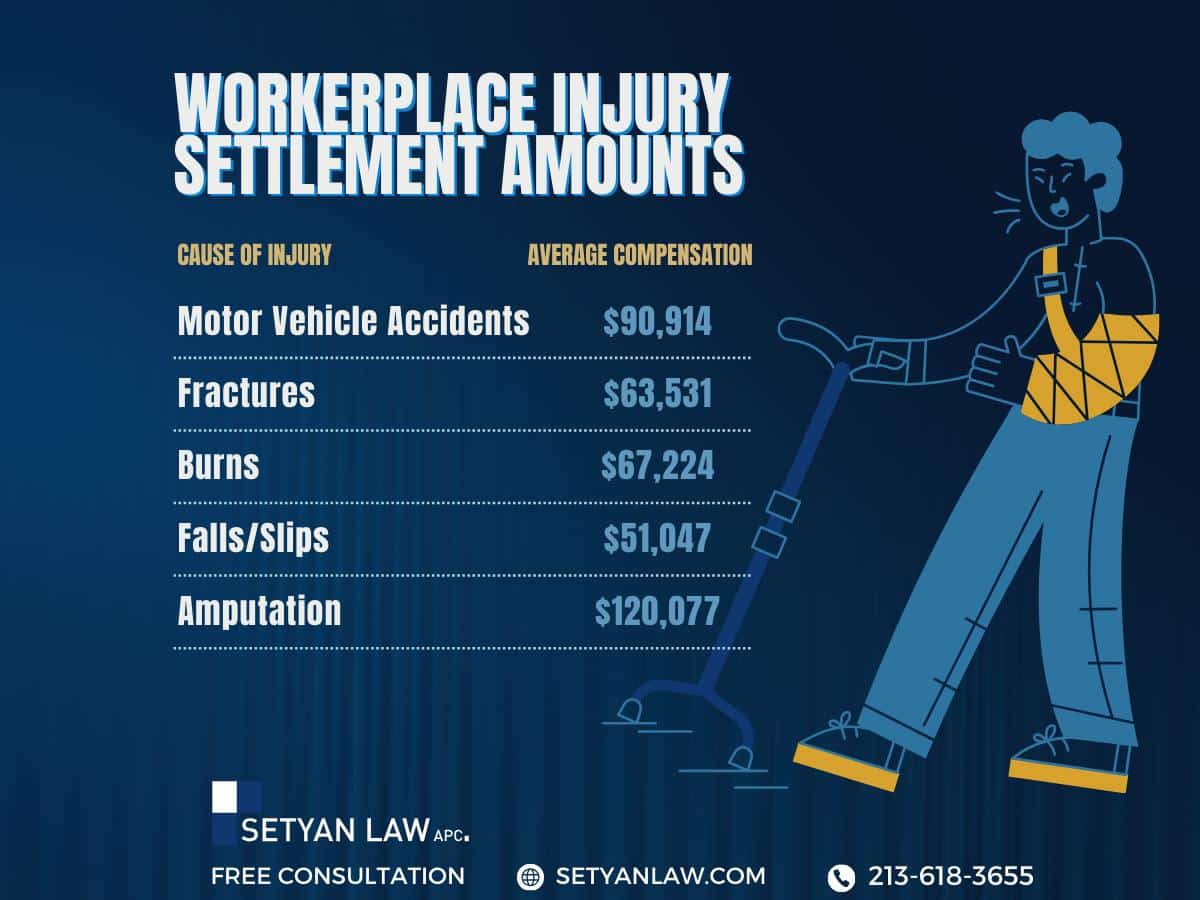Updated October 15, 2025
How Long Does Workers' Comp Take in California? [2025 Timeline Revealed]
Waiting to find out how long does it take to get workers' comp approved can feel like an endless journey when you're dealing with a workplace injury. While California law provides specific timelines for each step of the process, many injured workers find themselves confused by the complex system and uncertain about when they'll receive benefits.
Understanding the workers' compensation timeline in California is crucial for protecting your rights and planning your financial recovery. From the initial 30-day reporting window to the insurer's 90-day decision period, each phase follows specific legal timeframes that directly impact when you'll receive compensation. However, the actual duration varies significantly based on your injury's severity, claim complexity, and whether disputes arise during the process.
Fortunately, this guide breaks down exactly what to expect at each stage of your workers' compensation claim in California. Whether you're dealing with a straightforward injury that might resolve in 3-6 months or facing a complex case that could extend beyond a year, knowing these timeframes helps you navigate the system more effectively while ensuring you receive the benefits you deserve.
Initial Steps After a Workplace Injury
The clock starts ticking immediately after a workplace injury in California. Taking the right steps in the correct order not only speeds up your workers' compensation approval process but also protects your legal rights to benefits. Here's what you need to do first:
Report the injury within 30 days
California law requires injured workers to report workplace injuries to their employer within 30 days of the incident [1]. This isn't just a suggestion—it's a legal requirement that directly impacts your eligibility for benefits. Failing to notify your employer within this timeframe could result in:
- Complete forfeiture of workers' compensation benefits [2]
- Unnecessary delays in your claim processing
- Complications with medical treatment authorization
- Potential challenges in proving the injury was work-related
Even if you think your injury seems minor, report it anyway. Some injuries that appear insignificant initially can develop into serious conditions later. When reporting, be specific about how, when, and where the injury occurred.
Submit the DWC-1 claim form
After reporting your injury, your employer must provide you with a DWC-1 claim form within one working day [3]. This form is the official document that initiates your workers' compensation claim. If your employer doesn't give you this form, you can download it directly from the California Department of Industrial Relations website [4].
Complete only the "employee" section of the form, sign and date it, and return it to your employer promptly [3]. Keep a copy for your records. For added protection, consider using certified mail with return receipt if submitting by mail [3]. Remember—without submitting this form, your employer and their insurance company have no legal obligation to provide benefits [4].
Seek immediate medical treatment
Getting proper medical care is critical both for your recovery and your workers' compensation claim. If your injury requires emergency treatment, seek care immediately at any medical facility [5]. For emergency situations, you don't need prior authorization, and the workers' compensation insurance carrier cannot deny this treatment [5].
For non-emergency injuries, your employer generally has the right to direct you to their designated medical provider for the first 30 days after they know about your injury [6]. After this 30-day period, you may switch to a physician of your choice within a reasonable geographic area [6]. If you predesignated your personal physician before your injury, you might be able to see them immediately [3].
Remember that medical care for work-related injuries must be paid for by your employer—you should never receive a medical bill as long as you filed your claim form and your physician knows the injury is work-related [6].
Employer submits claim to insurer
Once you return the completed DWC-1 form, your employer must complete their section and forward it to their workers' compensation insurance company within one working day [7]. Additionally, your employer must submit an Employer's Report of Occupational Injury or Illness within five calendar days of knowing about your injury [7].
Generally, the insurance company has 14 days to mail you a letter about the status of your claim [3]. During this initial review period, your employer must authorize appropriate medical treatment worth up to $10,000 while determining whether to accept or deny your claim [4].
For serious injuries resulting in hospitalization, amputation, loss of an eye, or death, your employer must also report the incident to Cal/OSHA within eight hours [8]. Failure to report properly can result in significant penalties—employers may be fined $500 for each failure to report a work injury [9].
Claim Processing and Investigation Timeline
Once your claim reaches the insurance company, a crucial phase begins. The investigation period determines whether your case will proceed smoothly or face complications that could extend your timeline for months.
Insurer's 90-day decision window
After receiving your claim, California law gives workers' compensation insurance carriers precisely 90 days to make a determination on your case [10]. This timeframe is strictly enforced—if they fail to approve or deny within this window, your claim is automatically considered accepted under the law [10].
Throughout this investigation period, the insurance company will:
- Review accident reports and injury details
- Interview you, your supervisor, and potential witnesses
- Assess your medical records and doctor's evaluation
- Investigate your medical history
- Determine if your injury is work-related
First of all, it's important to understand that even during this investigation period, the insurer must authorize up to $10,000 in medical treatment for your work-related injury [11]. This ensures you receive care while awaiting the final decision.
Many workers wonder exactly how long their specific claim will take. Though the 90-day maximum applies to all claims, straightforward cases with clear work-relatedness often receive decisions much sooner—sometimes within 14-30 days. Complex cases involving severe injuries or disputed circumstances typically require the full investigation period.
Temporary disability benefits during review
Throughout the investigation phase, you may qualify for temporary disability (TD) payments if your injury prevents you from performing your usual job duties. These benefits equal two-thirds of your gross pre-tax wages, subject to state-established maximums [11].
To receive these payments, your doctor must certify you can't perform your regular work for more than three days or that your condition required overnight hospitalization [12]. Once approved, TD payments must be distributed every two weeks [12].
For claims filed after April 19, 2004, temporary disability benefits generally cannot exceed 104 weeks within a two-year period from the first payment [11]. For injuries occurring after January 1, 2008, the 104-week maximum applies within a five-year timeframe from your injury date [11].
Be aware that the insurer can delay your first TD payment while investigating claim validity [11]. Should this occur, you must receive a formal delay letter explaining:
- Why payments are being withheld
- What additional information is needed
- When you can expect a decision
Medical records and witness statements
The investigation's thoroughness depends largely on the documentation gathered. Medical evidence serves as the foundation of your claim and typically includes:
- Physician diagnosis and treatment plans
- Progress notes documenting your recovery
- Functional capacity evaluations
- Specialist consultations and findings
Consequently, delayed medical records represent one of the most common causes of extended timelines [13]. Insurance companies require comprehensive documentation before making decisions, and gaps in your medical record can postpone your case resolution.
Similarly, witness statements provide crucial context about how and when your injury occurred. Employers who delay submitting their accounts or conflicting witness testimonies may extend the investigation timeline [13].
In situations where you disagree with your treating physician's assessment, you may undergo evaluation by a qualified medical evaluator (QME) [12]. QMEs are physicians who meet additional educational and licensing requirements specifically for workers' compensation cases [12]. Alternatively, if you have an attorney, they might arrange for an agreed medical evaluator (AME) with the claims administrator [12].
Once the investigation concludes, you'll receive one of four possible outcomes: claim acceptance with benefits, claim denial with appeal rights, dispute resolution through negotiation, or progression to litigation for contested claims [14].
Approval, Denial, and What Happens Next
After the investigation phase comes the critical decision point in your workers' compensation case. The insurer will either approve or deny your claim, setting in motion the next steps in your journey toward recovery and compensation.
What happens if your claim is approved
Upon approval, your benefits will begin flowing automatically. You'll receive several types of compensation depending on your situation:
First of all, your medical treatments will be fully covered with no out-of-pocket expenses as long as they're deemed necessary for your work-related injury. Furthermore, if you've been unable to work, temporary disability payments (typically two-thirds of your average weekly wages) will continue until you reach maximum medical improvement (MMI).
Once your condition stabilizes and becomes "permanent and stationary" (P&S), your doctor will evaluate you for permanent disability. This evaluation determines if you'll receive ongoing benefits and helps calculate your settlement amount. At this point, your case moves toward resolution through either a Compromise and Release (lump sum) or Stipulated Award (ongoing payments).
What to do if your claim is denied
Receiving a denial letter doesn't mark the end of your case. Insurance companies must provide a written explanation for their decision. Subsequently, you have several options:
- Request a second medical opinion if the denial was based on your doctor's assessment
- File an appeal with the Workers' Compensation Appeals Board (WCAB) within 20 days of receiving the denial letter [15]
- Request a qualified medical evaluation to resolve disputes about your condition
Remember that if your employer's insurer doesn't accept or reject your claim within 90 days, your injury is automatically presumed to be covered under California law [16]. Additionally, even during the appeal process, you should continue medical treatment through your personal insurance while your case proceeds.
Understanding the QME process
Qualified Medical Evaluators (QMEs) are physicians certified by California's Division of Workers' Compensation to perform independent evaluations when disputes arise in your case [17]. These doctors undergo special training and testing specifically for workers' compensation evaluations.
The QME selection process typically begins when either you or the claims administrator requests an evaluation. Unless you have an attorney, you'll receive a randomly generated panel of three QMEs from which you must select one within 10 days—otherwise, the claims administrator chooses for you [18].
The QME's report carries significant weight in your case. It addresses critical questions about work-relatedness, necessary treatment, disability status, and work restrictions [19]. Essentially, this report often becomes the decisive evidence that determines whether your benefits continue, whether you qualify for permanent disability, or whether your case moves toward settlement.
Factors That Can Delay Your Workers’ Comp Case
Various factors can significantly extend the timeline for your workers' compensation case beyond the standard processing periods. Understanding these potential roadblocks helps you manage expectations and take proactive steps to minimize delays.
Severity and complexity of the injury
Complex injuries naturally take longer to process. Cases involving multiple body parts, psychological components, or permanent disability typically require more extensive medical evaluations and documentation. Moreover, severe injuries often necessitate specialized treatment from multiple providers, each needing to submit detailed reports. Back injuries, head trauma, and cumulative trauma disorders particularly tend to extend timelines due to their complicated recovery patterns and treatment requirements.
Disputes over work-relatedness
When insurers question whether your injury is genuinely work-related, the investigation intensifies. Pre-existing conditions often trigger these disputes, especially when symptoms could potentially stem from activities outside the workplace. In fact, cases involving disputed causation typically take 3-6 months longer to resolve than straightforward claims. The insurance company may investigate your medical history, request additional witness statements, or require specialized evaluations to determine causation.
Delays in medical documentation
Missing or incomplete medical records frequently stall workers' compensation cases. Treatment documentation serves as the foundation for benefits decisions, and gaps in these records can postpone your entire claim. Physicians who are slow to respond to requests for medical reports, illegible documentation, or contradictory findings between different medical providers all contribute to extended processing times. Detailed documentation of work restrictions, disability status, and treatment recommendations is essential for timely claim resolution.
Legal appeals and WCAB hearings
Formal appeals through the Workers' Compensation Appeals Board (WCAB) add significant time to your case timeline. The progression typically includes:
- Filing an Application for Adjudication of Claim
- Mandatory settlement conferences
- Trials before a workers' compensation judge
- Potential appeals to the WCAB commissioners
Despite the mandatory timelines in California law, the appeals process often extends case resolution by 12-18 months beyond standard processing periods.
How Long Does It Take to Reach a Settlement?
The final stretch of your workers' compensation journey involves reaching a settlement. Settlement timeframes vary dramatically based on several key factors that impact when you'll finally receive compensation.
Simple cases: 3–6 months
Straightforward claims with minor injuries and clear liability often resolve quickly. Indeed, most minor cases settle within 6 to 9 months [3]. For claims with minimal disputes and early Maximum Medical Improvement (MMI), resolution can occur in as little as 6-8 weeks [3]. Nonetheless, only about 20% of claims are settled within six months [4].
Complex cases: 1 year or more
Claims involving serious injuries, disputed liability, or ongoing treatment typically take significantly longer. Accordingly, complex cases commonly require 1-2 years or more to settle [3]. Remarkably, a recent report revealed that 90% of California workers' compensation claims take about 7 years to fully close—substantially longer than the national median of 3 years [20].
Compromise & Release vs. Stipulated Award
Your settlement type affects timing. Compromise & Release (C&R) provides a lump-sum payment covering all benefits but closes future medical coverage [21]. Conversely, Stipulated Awards offer periodic disability payments with continued medical care coverage [21]. C&R settlements typically process faster, with payments received within 30 days of approval [22].
Role of Maximum Medical Improvement (MMI)
MMI—when your condition stabilizes—is the critical milestone before most settlements [23]. Reaching MMI typically takes 6-12 months [3], triggering permanent disability evaluation and enabling settlement discussions [23].
Conclusion
Navigating the California workers' compensation system requires patience and understanding of the established timelines. Workers must report injuries within 30 days and promptly submit their DWC-1 claim form to start the process. Subsequently, insurance companies have up to 90 days to investigate and make a decision, though straightforward cases often resolve faster.
Throughout this process, your medical documentation plays a crucial role in determining how quickly your claim progresses. Disputes over work-relatedness or complex injuries certainly extend these timelines, sometimes pushing resolution beyond a year. Similarly, cases requiring appeals through the Workers' Compensation Appeals Board add substantial time to your claim.
Settlement timelines vary significantly based on case complexity. Minor injuries with clear liability might resolve within 3-6 months, while complicated cases typically take a year or longer. Additionally, reaching Maximum Medical Improvement represents a critical milestone before most settlements can finalize.
Understanding these timeframes helps injured workers set realistic expectations and plan accordingly during their recovery. Despite the mandatory deadlines established in California law, actual processing times depend heavily on your specific situation. Therefore, maintaining detailed records, following reporting requirements, and seeking qualified assistance when needed will help ensure you receive the benefits you deserve within the shortest possible timeframe.
Contact an Employment Lawyer
Catastrophic injuries can significantly impact an individual’s life, especially regarding employment and financial stability. Understanding the rights and benefits available under California workers’ compensation laws is essential for those affected. Legal representation can provide invaluable support in navigating the complexities of claims, ensuring that injured workers receive the compensation they deserve. If you or someone you know is dealing with the aftermath of a catastrophic injury, consider seeking legal assistance to fully understand your rights and options.
Los Angeles attorney Sam Setyan has helped countless clients in your situation.
Call Setyan Law at (213)-618-3655 for a consultation.






